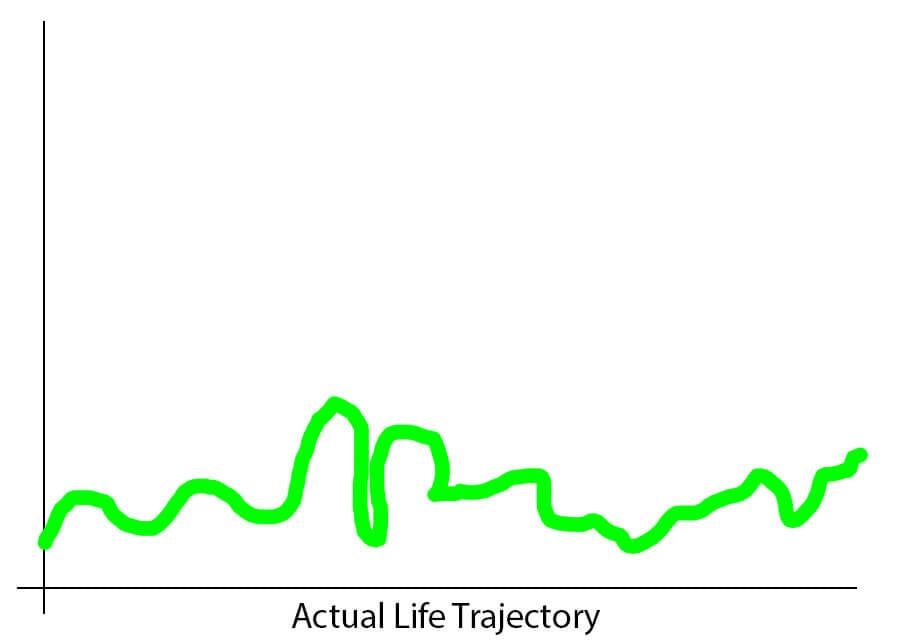If you’re a college student in the U.S., you’ll likely start classes in a week or so (if you haven’t already). For many of you, this will be your first semester of college.
Since I’m about to start my senior year, I’ve been reflecting on all the things I’ve done and learned over the past three years. It’s hard to believe it’s gone so fast.
As I reflect, I realize that much of college was very different from what I had imagined and what other people had told me.
Nowhere was this more true than my first year of college.
There are a lot of myths floating around out there about your freshman year. Some of them contain truth, but many of them unnecessarily fill first year students with dread. Which sucks, because you’ve got enough to think about as it is.
To help you start your semester a little more blissfully, today’s post will debunk ten common myths about your first year of college.
This list is by no means comprehensive, but it addresses ideas that I either frequently heard or frequently see pop up on places like Reddit. I hope you’ll leave this post relieved and even a little amused.
1. The classes you take your first semester determine the course of the rest of college/your life.
Okay, so this one isn’t entirely false. You should give some thought to the classes you pick your first semester, especially if you’re considering a major with a very rigid curriculum.
But often, you won’t have that much choice with the courses you take your first semester. You’re the last group of people to register, and many of your dream classes will be taken already.
This is okay. You should view your first (and even second) semester as a time to figure out what you want to study. Many universities will require (or strongly encourage) you to pick a major when you enroll, but don’t feel locked in by that choice. Use the classes you take to learn about what you like (and what you can’t stand).
Of course, if you can then I encourage you to take some classes that both interest you and help you meet gen-ed requirements (if your school has those). That way, it’s a win-win whether or not you like the class.
And even more broadly, you should stop worrying so much about how your major relates to your future career. Odds are, it won’t. At least not directly.
You’ll learn general types of skills that will help you on your path, but your specific undergrad degree is unlikely to tie directly into your future career (as any English major can tell you!).
In sum, be deliberate when picking your first semester courses, and take the courses seriously, but don’t freak out if they don’t align with your ten year plan (more on this later).
2. Sleep, social life, studies – pick two.
I’m so sick of this one. It seems that before the start of every school year there’s a thread on r/college where someone throws this one out as “advice for new college students.” It doesn’t have to be this way. This is a false dichotomy. You can have all three, while still being healthy and generally composed.
I think this myth comes from from two common problems students have: poor planning and overscheduling.
Poor Planning
Or often just “no planning.” Yes, if you wait till the last minute to do every assignment, then one of the above three categories is going to suffer (in fact, it’s usually all of them).
If you forgot you had a paper due tomorrow because you didn’t put it on your calendar, then you’re going to stay up all night working on it, which will likely result in a lower grade and the decidedly antisocial act of locking yourself in your room as your pores exude caffeine faster than you can drink it.
You can easily avoid this madness by making a weekly plan, checking your calendar as part of your morning routine, and using the fudge ratio to make sure you have more than enough time to do your assignments.
Overscheduling
It’s very common to overschedule yourself your first year. A typical day for me back then looked something like this:
- 11 am: wake up
- 12 – 3: attend class
- 3 – 3:30: scarf down lunch
- 3:30 – 4: saxophone lesson
- 5 – 6:30: marching band practice
- 6:30 – 7:00: inhale dinner
- 7 – 9: jazz ensemble practice
- 9 – 11: procrastinate on doing homework
- 11 – 3: finish homework between bouts of internet distraction before collapsing into bed
And this was just one day. Over the course of the week, I had probably 10 different meetings, practices, and appointments.
This created a schedule with very little margin for error. When something additional cropped up, or if I got sick, or even if an exciting opportunity presented itself, my schedule was too tightly packed to allow me to respond. Not to mention that I was incredibly stressed and sleep-deprived.
Because I falsely believed that this was “the way things were supposed to be,” I didn’t do anything to change it until my sophomore year, when I finally cut my schedule back to something more manageable.
“Create a schedule with more margin.”
I’ll advise you to avoid making the same mistake and create a schedule with more margin. If you’re interested in learning how to do this (while still making awesome grades and having a spectacular time), I recommend you check out Cal Newport’s How to Win at College and Thomas’s Ten Steps to Earning Awesome Grades.
Honestly, though, you’re probably still going to overschedule yourself. It’s part of the college learning process. You’ll quickly realize how much you can handle. The key is to recognize when you’re spread too thin and correct as soon as possible.
3. You’re on your own in college.
I remember that all throughout my last couple years of high school, my teachers would say something similar to the following:
“No one’s going to be there to hold your hand in college, so you better learn to work on your own.”
This was usually a line they would pull when no one had done a homework assignment or any time people seemed to be slacking. I recall it being pretty motivating at the time, but also scary.
It’s easy for high school students who hear a version of this threat to make the leap from “No one’s going to hold your hand” to “No one’s going to help you ever.”
These are vastly different statements, however. You aren’t on your own in college. Far from it. Yes, you do have to be more motivated and self-directed, and your professors aren’t going to automatically pull you aside if you’re doing poorly in a class.
But plenty of resources exist if you want them! In fact, I’d venture to say that in college you have access to more resources than ever before:
- Struggling in a class? Tutors are available.
- Freaked out about what to do after graduation? Career counselors are there to help.
- Feeling lonely, stressed, or depressed? Personal counselors have your back.
These are only a few of the resources available to you in college. The common thread among all of them is that they can only help you if you seek them out.
It’s not that no one cares about your wellbeing. It’s just that college is a big place, and it’s up to you to find and use the service you need.
And if you’re not sure if the service in question is available, ask! Ask your RA, an older student, or any of the student services offices. You don’t have to go it alone. Besides, you’re paying for all this stuff one way or another, so you might as well use it.
4. You need a car to have fun in college.
I go to college in a small, relatively isolated town in rural Northeast Ohio. The nearest major city is a 45 minute drive away. We have a movie theater, a megamart, and one sad, limited bus system. Not a college bar or club in sight.
A lot of people conclude from this that I must go out of town every weekend to have fun. How, they wonder, could you have any kind of fun at all in such a small place?
The short answer is that you just need to be more creative! Use your imagination. While the town is small, it has so much to offer. And I didn’t go there for the town. I went there for the school. I went there for the people.
You can make your own fun, big city or no. Mind you, there are some people who would probably go crazy living in such a small town, and even I’ll admit I plan to move somewhere a bit bigger after college.
But making your own fun is part of college. Heck, it’s part of growing up.
Take it from Austin Kleon:
“My favorite American story: we lived where nothing was happening and we made something happen ourselves.”
Remember: if everywhere you go is boring, the common denominator is not the rest of the world, but you.
5. You’ll drift apart from your high school/childhood friends.

This one is tricky. The fact is that yes, you probably will drift apart from people you knew in high school. It’s inevitable, especially if you go to different colleges (even more so if one of you pursues a different path from college altogether). Relationships change, and not always for the better.
But it doesn’t have to be this way. It’s not something inevitable. Like any relationship, it has to be nurtured and maintained. If you’re worried you won’t stay friends with people you knew in high school, then make an effort to hang out with them whenever you can.
Since I go to a college eight hours from my hometown, that usually means that I have to be the one to make the effort. Whether it’s hanging out when we’re all home on break or taking an epic road trip to Washington, D.C., I’ve made the effort, and it’s paid off. I still count the people I knew in high school as some of my best friends.
Of course, you shouldn’t let your fear of losing old friends cut you off from making new ones. College provides a wonderful blank slate. If you were unsatisfied with your life in high school, here’s a whole new chance to start over.
College will expose you to a much broader cross section of people than before. Embrace this and take it as an opportunity to become friends with people you never would have imagined.
All this is to say that your relationships are not something beyond your control. Accept that not everything will last, but know that drifting apart isn’t guaranteed.
6. Loud, sweaty, drunken frat parties are the only social outlet.
If you’re anything like me, much of how you imagined college was shaped by movies. Films like Animal House, Pitch Perfect, and The Social Network give a pretty unrealistic view of what college is like.
One of the stereotypes that such movies perpetuate is the wild fraternity party as the epitome of college social interaction. If you’re not pulling keg stands and screaming at people in a packed room full of strobe lights and bad decisions, you’re not “doing college right.”
This is so mistaken. Parties like this do exist, of course, and if that’s what you’re into, more power to you (just please be safe). But there’s so much more to socializing in college.
In an average week, I probably hang out in someone’s dorm room playing Bananagrams, watch a free public showing of a classic movie, have lunch with a regular group, and maybe meet for drinks at a bar. On the odd occasion I’ll even go to a house party.
And these are just a few of the things available. There’s no script for college. Find whatever kinds of socializing you want. Find friends who enjoy the same activities. Because if you don’t even like sweaty frat parties, why would you expect to meet people you enjoy by attending them?
It’s such a tired phrase, but “you do you” should be your motto when it comes to socializing in college.
7. For every hour of time in class, you should spend an hour studying outside of class.
Or two, three, or even four hours. The number varies, but this is an idea that many colleges themselves promote. You’re likely to have a professor tell you this your first semester.
I’m here to tell you that this just isn’t true.
Here’s how much time you should spend working on material outside of class: as much as you need.
It’s ridiculous to think that you’ll spend the same amount of time on an easy class as you will a hard one. That’s just a waste of time. Unless the class requires you to log the number of hours you spend on work (very unlikely), all that matters is results.
“There is no best way to work – only the way that works best for you.”
If you can complete an assignment in thirty minutes, don’t spend another hour staring at it because you think you need to “put in your time.” Use that time for more challenging assignments, to learn new things on your own, or to have high density fun.
In practice, this is what you’ll end up doing anyway. There’s a natural triage that develops with your classes, where you learn how much time you have to spend working for each. Embrace this way of working, and don’t feel guilty about “neglecting” classes that take less effort.
Learning to prioritize and complete work efficiently is a valuable skill for any career, so you’ll do yourself a favor if you develop it in college.
Remember: there is no “best” way to work – only the way that works best for you.
8. You’ll eat only ramen and cheese spray.
College is a time of culinary adventures, no doubt. I’ve microwaved my share of Nutella covered crackers and scraped plenty of instant ramen containers dry in my time. But eating cheaply doesn’t have to mean eating like crap.
If you have a meal plan, things aren’t that hard. Just eat mostly vegetables, fruits, and proteins. Keep the processed crap to a minimum. This may require doing creative things like asking for a sandwich with no bun or piecing together a salad from fajita ingredients, but it’s quite possible.
And if you’re cooking your own food, the solution is much the same. Just learn to cook a few healthy, flexible dishes like stir fry. Invest in a few storage containers with lids, cook in big batches a couple times a week, and reheat food as you need it.
You can easily eat like this in most parts of the U.S. for around $20 a week, maybe less if you’re good at couponing and bargain hunting. It’s certainly enough to survive on even if you only have a part-time job.
If you want more info, Thomas and Martin did a whole podcast episode on eating cheaply, healthily, and quickly in college.
9. All of your classmates have the next 10 years of their lives figured out.

Sadly, this is a myth that persists even when you’re in college. Listening to students who claim to have every moment of college and the ensuing several years planned out can make you feel like an aimless slacker.
You’re not.
First off, people who make grand plans like that have no more control over the future than you do. It can be calming to some people to chart things out like that, and it’s not (necessarily) a terrible exercise.
But I can almost guarantee that if you had one of those detailed planners look back in ten years, they’d admit that things took a much different course than they imagined. Some events are in your control, but most aren’t. The only thing you can control is how you react to what life brings.

Second, making too detailed of a plan can limit your openness to valuable opportunities and possibilities. How would things have turned out for the Wright brothers if they had said, “Well, making airplanes doesn’t fit into our bicycle maker job description, so we can’t do that.”
This idea goes hand in hand with not overscheduling yourself. You need to have to time to explore exciting opportunities, but you also need the open mindedness to recognize them to begin with.
Have some sort of plan. But don’t be afraid to change it and make things up as you go along.
10. The friends you make your first semester are the only friends you’ll make for the rest of college.
“If you believe friends are scarce, then that will become a self-fulfilling prophecy. Luckily, the opposite is also true.”
Now, it’s true that the first semester of your freshman year is a great time to make friends. You have a guaranteed commonality with all of your classmates: being new and confused. But don’t think that if you don’t make tons of friends your freshman year you’ll never make friends ever.
This (and actually many of the myths in this article) comes in part from having a scarcity mindset. If you believe that friends are scarce and that you can’t meet new people after your first semester, that will become a self-fulfilling prophecy.
On the other hand, if you recognize that everyone you meet is a potential friend and that friendship just comes down to repeated meaningful, shared experiences over a sufficient period of time, you’re likely to make lots more friends even beyond your first semester.
I didn’t meet (or at least become close to) some of my best friends until my Junior year. Friendship takes time, so don’t worry. If you put yourself in the right situations, it will come.
Conclusion
When you’re facing something as strange and unknown as college, it’s natural to seek information everywhere you can. Every admonition or anecdote seems to pull back the veil of mystery just a couple inches. But the fact is, you won’t know what college is like until you get there.
Furthermore, you are not a passive participant in your college experience. You define what it is, first and foremost. Don’t let myths that random strangers on the internet (or even well-meaning family/friends) tell you turn into self-limiting beliefs.
Make whatever you want of college. Make something great of it. It’s only four years, and damn do they go by fast.
What crazy college myths have you heard? Have any of them turned out to be true? Share your experiences in the comments section below or in the CIG community. Just make sure you don’t start any new myths. 🙂
Image Credits: brown concrete building


